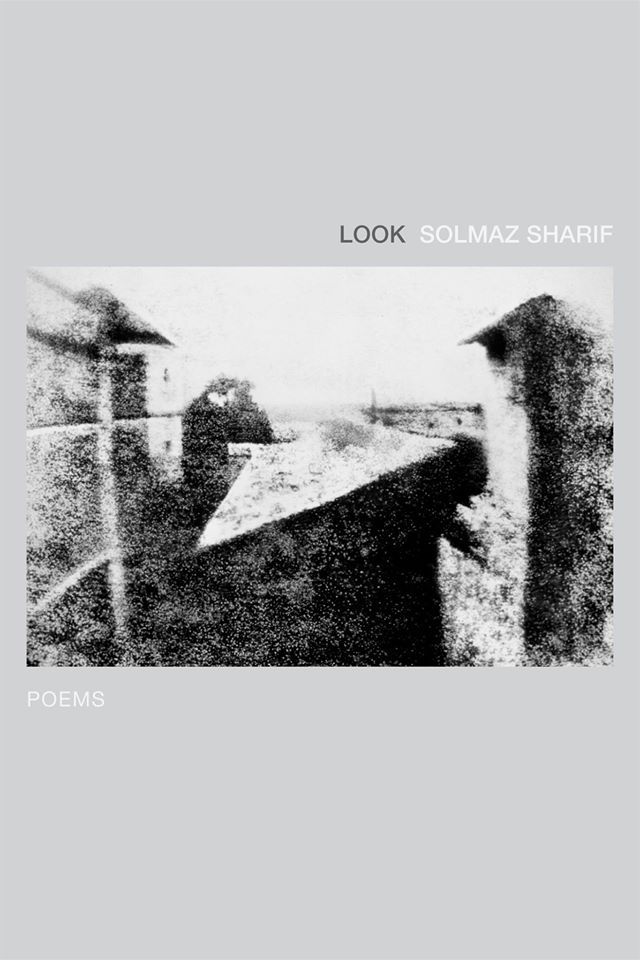Look
by Solmaz Sharif
reviewed by Julie Swarstad Johnson
“According to most / definitions, I have never / been at war,” writes Solmaz Sharif in Look, her highly anticipated debut poetry collection. A crucial statement follows: “According to mine, / most of my life / spent there” (“Personal Effects”). Sharif, a poet of Iranian descent and a Jones Lecturer at Stanford, delivers a complicated, commanding account of contemporary American life for those who live under constant suspicion because of their origins. The poems in Look shift between clear-eyed description and exhausted wariness, painful in their honest assessment of the destruction caused by our present conflicts and ways of being.
He was moved like that
across a minefield—
moved by a hand we cannot see,a hand that is all our hands combined. (“Personal Effects”)
In Look, Sharif makes powerful use of personal narrative and reclaimed military language to illustrate the ways the hand of war “is all our hands combined.” No one is unconnected to war in this urgent, impassioned collection.
“It matters what you call a thing,” begins Look’s title poem. The statement appears after a jarring epigraph: a definition of the word “look” from the US Department of Defense’s Dictionary of Military and Associated Terms. In a military context, the epigraph tells us, “look” means “a period during which a mine circuit is receptive of an influence”—lethal force described with bland, circuitous language. Terms from the Dictionary appear throughout Look, printed in small capital letters and used as titles, lists, keywords, or starting points for poems. Taken out of a military context, these terms’ overtly sexual, coercive nature frequently becomes apparent: “Please come with a safe password and a nickname, we’ll provide penetration aids and restraints” (“Special Events for Homeland Security”). More often, however, Sharif underscores the way these terms negate the value of human life:
Daily I sit
with the language
they’ve madeof our language
to neutralize
the capability of low dollar value items
like you. (“Personal Effects”)
Terms from the Dictionary disrupt seemingly private moments: “Whereas the lover made my heat rise, rise so that if heat sensors were trained on me, they could read my
thermal shadow through the roof and through the wardrobe” (“Look”). The personal and the political are inextricable, Sharif reminds us.
Throughout Look, Sharif incorporates fragments of conversation, calling to mind Claudia Rankine’s Citizen: An American Lyric. In Citizen, instances of subtle and outright racism elicit disbelief from the book’s speaker: “What did he just say? Did she really just say that? Did I hear what I think I heard?” For Sharif’s speaker, the surprise comes at what she hears herself saying:
I feel like I must muzzle myself,
I told my psychiatrist.“So you feel dangerous?” she said.
Yes.
“So you feel like a threat?”
Yes.
Why was I so surprised to hear it? (“Desired Appreciation“)
Sharif demonstrates that a life lived under scrutiny and suspicion (“my father says say whatever you want over the phone”) erodes one’s ability to trust oneself (“my mother has a hard time believing anything’s bugged,” “Drone”). The world must always be faced with defenses up, a posture that leads to an internalized sense of self as threat.
Importantly, Look’s project is one of reclaiming. “Personal Effects,” a long poem focused on Sharif’s uncle—who was one of an estimated one million soldiers and civilians killed in the Iran-Iraq war—most fully realizes this act. In the poem, Sharif is “attempting [her] own // myth-making,” trying to reconstruct her uncle from photographs, letters, and fragmented family memories. The poem recounts its own making, including the incredulity of early readers who discounted Sharif’s ability to imagine her own uncle’s life: “‘How can she write that? / She doesn’t know,’ a friend, a daughter / of a Vietnam vet, told another friend.” Against this, Sharif argues passionately and persuasively for the powerful connection between imagination and empathy:
And I place in his hands his head
And I place in his hands my hands
And I place in his eyes a look we share in the rearview
And I place between us a bar of laughter
And I place between us the looking and the telling they want
dead (“Personal Effects”)
Although described in negative terms (“the telling they want / dead”), the effect of this imagined exchange between speaker and uncle is one of healing, one of connection and overcoming despite the barriers of silence and fear others would place between them.
Overcoming the barriers that fear erects between us—in the aftermath of horrific violence in Orlando, in a moment when political credence is given to racism and xenophobia—Look has been published just when it is most needed. Grief and wariness permeate the book and make these difficult poems to read, but the work they do is utterly necessary. Like Muriel Rukeyser’s lastingly important “The Book of the Dead,” Look immerses us in the disastrous impacts of widespread injustice. Rukeyser’s virtuosic documentary poem shed light on an industrial disaster that caused the deaths of hundreds of miners, the result of corporate and governmental negligence; with similar turns of reportage and lyricism, Sharif’s Look exposes the pervasive trauma of war and of being labeled a potential threat by your country and by those with whom you interact daily. “[I]t was his bare toes / that made me cry / because I realized then he had toes,” Sharif writes of a photograph of her uncle (“Personal Effects”). To see another person’s humanness: Look calls us back to this most simple, this most essential task.
Published on July 5, 2016

